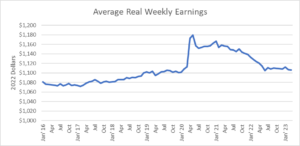Kevin McCarthy’s Big Lie About Wages – OpEd
By Dean Baker
Glenn Kessler, the Washington Post’s long-time fact checker, usually tries to be fair, but he really fell down on the job in a piece evaluating Kevin McCarthy’s claim that Biden’s policies cost families $7,400 a year. As the headline tells readers, Kessler concluded that it “depends on your math.” Nope, it depends on being honest.
As Kessler explained, the number came from E.J. Antoni, a research fellow in regional economics with the Heritage Foundation’s Center for Data Analysis. There are two parts to Antoni’s calculation.
The first part looks at average weekly earnings. Antoni said that average real weekly earnings were 5.1 percent lower in the most recent month than when President Biden took office in January of 2021. This loss came to $2,802.77, over the course of a year. Antoni doubles this figure, assuming two workers per household, which gives him a loss of $5,605.53 due to lower pay.
As Kessler sort of points out, this figure is distorted by composition effects. Millions of lower paid workers lost their jobs in 2020, which raised the average wage of those still working. We can see that story clearly if we look at the longer picture.
As shown below, average real earnings soared in April of 2020, as millions of workers in hotels, restaurants, and other low-paying industries lost their jobs.
Pay fell as workers in lower paying industries got their jobs back. This decline did not reflect a fall in the real wages of individual workers, but rather a change in the mix of workers. In fact, the pay of low-wage workers rose rapidly in this period.
Anyhow, if we don’t cherry pick our starting points, we can see that the real (inflation-adjusted) weekly wage was almost exactly the same in March of 2023 as it was in February of 2020, just before the pandemic hit.[1] But the average weekly wage is only part of the earnings story.
The unemployment rate in January of 2021 was 6.3 percent; it was 3.5 percent last month. This meant that many more people were working. The employment rate, the flip side of the unemployment rate, went from 57.5 percent of the adult population, when President Biden took office, to 60.4 percent in March.
This means that workers were 5.0 percent more likely to be employed in March of this year than in January of 2021. According to advanced economic theory, people who work earn more money than people who don’t. If we’re doing a serious comparison of people’s earnings, we have to consider the likelihood that they have a job. Speaker McCarthy’s numbers did not.
If McCarthy’s numbers on earnings are a bit screwy, the other part of his calculation is even worse. Kessler tells readers:
“Higher borrowing costs add another $1,500 to the figure, for a total of about $7,100. His calculation is based on higher mortgage rates on the median sales price of an existing home that have resulted as the Federal Reserve has jacked up interest rates in an effort to tame inflation.”
As Kessler points out, most people do not buy a home every month, so adding this $1,500 figure into the mix is rather dubious. But the actual story is even worse. While it has largely escaped the attention of business reporters, tens of millions of people refinanced their homes in the years from 2020 to 2022, before rates started to rise.
According to the Federal Reserve Board, nearly one-fourth of all homeowners (roughly 17 million households) refinanced their mortgages in 2021. A studyusing data from the prior year found average savings of $279 a month ($3,348 a year) for homeowners who refinanced their mortgage.
In other words, if we want to make serious comparisons of economic well-being, and factor in mortgage interest costs, this would be a big positive in the Biden years. Nearly 20 million homeowners (many refinanced in the first months of 2022) refinanced their mortgages, saving themselves thousands of dollars in interest payments.
In short, there is literally nothing to Speaker McCarthy’s story of families taking a big hit to their income under Biden. Real wages are back to their pre-pandemic level and people are far more likely to be employed than when he took office. And, tens of millions of households are saving thousands of dollars a year on mortgage interest payments.
McCarthy’s claim is pants on fire stuff; it doesn’t depend on the math.
Notes.
[1] In fact, it was 0.2 percent lower in March of 2023, but the data do fluctuate. If Speaker McCarthy wants to make a big deal out of this 0.2 percent drop, it is probably worth mentioning that the March 2023 wage was 0.5 percent higher than the January 2020 wage, or that the January 2023 wage was 0.3 percent higher than the February 2020 wage.
This first appeared on Dean Baker’s Beat the Press blog.


